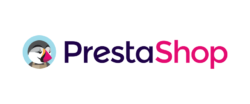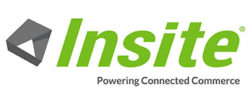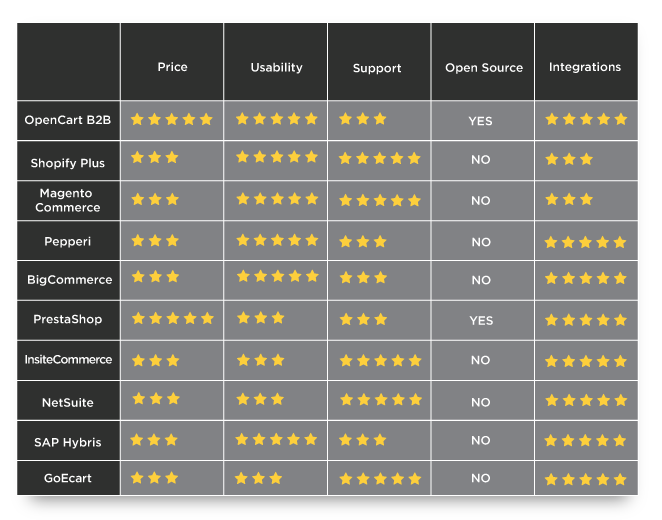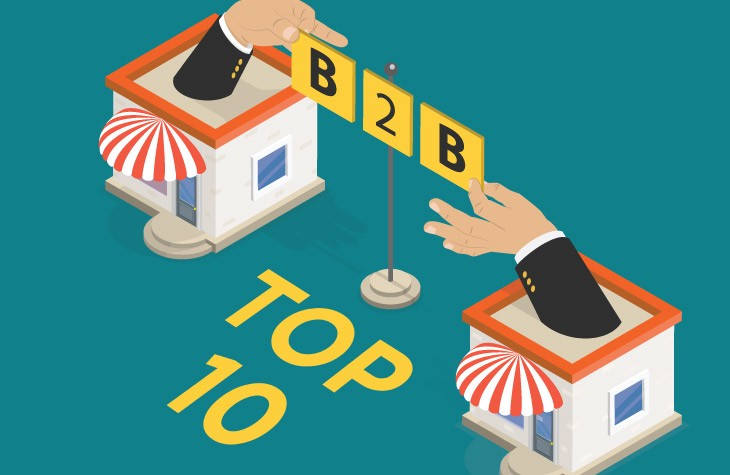Top 10 B2B eCommerce Platforms for 2019 (Source: Namogoo.com)
Mar 1, 2021
eCommerce is big business. Goliathes like Amazon and Alibaba have made it official. However, while eCommerce has solidified itself as a big brand playground, B2B eCommerce is still a wild frontier. Recently, Amazon has made initial probings into the B2B space. However, it is still a fragmented space with no clear dominating platform.
That doesn’t mean there aren’t several B2B eCommerce platforms to choose from. In fact, the industry’s fragmented nature has means there is a plethora of available B2B eCommerce platforms. With such a large and available variety of software solutions picking the right one for your needs can be difficult. We’re here to help:
THE MODERN B2B ECOMMERCE PLATFORM EXPLAINED
As I alluded to above, Amazon Business is pushing its way into the B2B space in a very similar strategy they successfully employed for B2C: act as a platform for buyers and sellers to learn, compare, and sell/buy. Same caveats too: Amazon takes a cut and sellers have very limited control over the buyer journey, which could mean diminished sales.
B2B marketing comes with its own set of challenges that are unlike those of B2C companies. This is where dedicated B2B eCommerce platforms come into play. More and more companies are realizing the importance of setting up their own online infrastructure to launch and promote their services. The additional marketing cost is proving to be worthwhile in order to establish a direct channel with customers, improve conversion rates, and increase brand awareness and customer lifetime value.
9 COMPARISON CRITERIA FOR B2B ECOMMERCE SOFTWARE
As mentioned above, choices are a good thing but can also create (good) problems. When standing in front of the smorgasbord of solutions at your disposal it is important to ask yourself if they have the following:
- Mobile Compatibility – More and more B2B decision makers are using their mobile devices to search for solutions. Not being mobile friendly can prove costly today.
- Compliance – The platform should be able to accommodate GDPR and other mandatory user privacy guidelines that are in effect today.
- B2B Functionality – Your B2B eCommerce platform should ideally have eCommerce features directed at B2B buyers like bulk ordering and pricing, account management, and multiple shipping/payment capabilities.
- Optimal User Experience – The user should have a customizable marketplace templates to choose from to create an intuitive and user-friendly experience.
- 24/7 Availability – Unlike the traditional method where clients need to wait for your response, eCommerce platforms are always open for business.
- Marketing functionality – With more and more online searches being made via web and mobile, SEO optimized eCommerce platforms boost your visibility.
- Staging environment – There is no way to sugarcoat the fact that humans are error prone. Automated platforms offer a consistent sales solution.
- Journey Templates – Selling complex solutions can be challenging. Implementing a digital configurator makes life easier for all sides involved.
- Customer Communications – Not only does the client get an instant response, he can also select his desired product/s with just a few clicks.
THE TOP 10 B2B ECOMMERCE PLATFORMS OF 2019
Besides the obvious parameters such as pricing, support and usability, we have given extra importance to the integration capabilities of these solutions. We understand that every company today has a complex software ecosystem and choosing a flexible eCommerce platform has become extremely important.
1. OpenCart B2B Marketplace
![]()
OpenCart, already a well known B2C eCommerce platform, is now offering a solution for B2B activities. There is even a free version with upgrades available in the form of extensions and add-ons, which may require some technical knowhow to install. However, this is a small price to pay for such a comprehensive solution.
Compatibility: Inventory/Supply (Y), SEO (Y), CRM (Y), Marketing (Y), Emails (Y)
Pros: Easy to Use, Strong Community, Good for Small Businesses
Cons: Requires Technical Knowhow, Iffy Customer Support
2. Shopify Plus

Citizen, Tesla, Motorola, Adidas and L’Oreal are just some of the globally recognized brands that are currently using Shopify Plus as their dedicated B2B business solution. Shopify is also well known as one of leading eCommerce B2C platforms, powering almost a million online shops. This proven track record is hard to argue with.
Compatibility:Inventory/Supply (Y), SEO (N), CRM (Y), Marketing (Y), Emails (Y)
Pros: Good Integration, Good Customer Support, Fast Interface
Cons: Pricey, Lack of Customization
3. Magento Commerce

This is an extremely popular B2B eCommerce platform which can be used in tandem with your B2C operations. Magento offers an easy-to-install and low maintenance product with good customer support. However, it does lack a few features on the integration side and can also prove to be too costly for small businesses.
Compatibility: Inventory/Supply (Y), SEO (Y), CRM (N), Marketing (N), Emails (N)
Pros: Friendly User Interface, Good Customer Support
Cons: On the Expensive Side, Limited Integration Capabilities
4. Pepperi

Pepperi is a globally recognized eCommerce brand with the latest product information on hand (inventory, specs, multiple views, videos, etc.), allowing you to match your offering to your customer by using the information you are presented. The customer support has been rumored to fall a bit short sometimes.
Compatibility: Inventory/Supply (Y), SEO (Y), CRM (Y), Marketing (Y), Emails (Y)
Pros: Industry Leading Visibility, Good Integration Capabilities
Cons: Not Cheap, Slow Customer Support, Suited for Enterprise Customers
5. BigCommerce

BigCommerce is a popular eCommerce store builder for B2B purposes, providing you with a comprehensive set of eCommerce tools out-of-the-box. You can access your audience and integrate this platform with most of the solutions required to set up a comprehensive and effective B2B eCommerce ecosystem.
Compatibility: Inventory/Supply (Y), SEO (N), CRM (Y), Marketing (Y), Emails (N)
Pros: Comprehensive Solution with Solid Functionality
Cons: Advanced Features Can Be Costly, Iffy Support
6. PrestaShop

PrestaShop is open source eCommerce platform and enables high level of customization. With PrestaShop, you can enjoy a selection of professional eCommerce themes, over 50 world-class payment solutions and gateways, integrated customer service tools and quick install features.
Compatibility: Inventory/Supply (Y), SEO (N), CRM (Y), Marketing (N), Emails (Y)
Pros: Value for Money, Good Functionality
Cons: Iffy Support, Cumbersome Installation/Maintenance
7. InsiteCommerce

InsiteCommerce is a multipurpose and out-of-the-box B2B eCommerce platform. It helps manufacturers and distributors by offering them endless possibilities and vast functionality. It delivers unique eCommerce user experiences that make it easier for your customers to understand your product and do business with you.
Compatibility: Inventory/Supply (Y), SEO (Y), CRM (Y), Marketing (N), Emails (Y)
Pros: Solid Integration Capabilities, Solid Customer Support
Cons: Complex Customization, Not Cost Friendly
8. NetSuite

NetSuite is one of the world’s leading B2B eCommerce platforms that offers a modern and scalable platform. NetSuite allows businesses to automate operations, decrease IT costs and improve real time visibility by providing a one-size-fits-all solution. You also get built-in business intelligence, reporting, and real-time visibility.
Compatibility: Inventory/Supply (Y), SEO (N), CRM (Y), Marketing (N), Emails (Y)
Pros: Comprehensive Offering, High Visibility, Good Integration
Cons: Steep Learning Curve, Not Pocket Friendly
9. SAP Hybris

Hybris is an innovative B2B eCommerce solution built for the modern-day requirements of the B2B industry. You can now use it to integrate your web service with ERP solutions. Hybris platform offers seamless integration with marketing tools and supports multiple languages and currencies for a great global reach.
Compatibility: Inventory/Supply (Y), SEO (Y), CRM (N), Marketing (Y), Emails (Y)
Pros: Great Integration Capabilities, Highly Customizable
Cons: Not for Small Businesses, Pricey, Iffy Support
10. GoEcart

This widely-used B2B eCommerce platform centralizes all order and inventory information across multiple sales channels into a single interface. GoEcart offers a seamless reporting system that helps in knowing information on performing products, customer preferences, demands peaks and more. SEO tools are also built in.
Compatibility: Inventory/Supply (Y), SEO (Y), CRM (Y), Marketing (N), Emails (N)
Pros: High Visibility / Lots of Insights, Effective CRM Capabilities
Cons: Not Pocket Friendly, Can Overwhelm Newbies

BUILD BRAND LOYALTY WITH YOUR B2B ECOMMERCE PLATFORM
With businesses increasingly realizing that Amazon Business is solely focused on turning inventory over quickly, there is a visible shift towards private B2B eCommerce platforms to build lasting relationships with clients. Amazon Business still has its advantages (easy, zero maintenance, traffic), but provides diminished returns in the long run.
Amazon simply cannot provide customers with a quality user experience, which is important to convey the company vision and product’s advantages to potential customers. The Top-10 list we have provided should help you pick the right B2B eCommerce platform and start bringing in clients for the long term.
Source:https://www.namogoo.com/blog/ecommerce/top-10-b2b-ecommerce-platforms-for-2019/
Related
-
Jul 24, 2023
Harnessing the Power of AI; Transforming Small Businesses
-
Jun 25, 2023
Revolutionizing Small Business: Unleashing the Power of Chat GPT.
-
May 31, 2023
Metaverse In Details
-
May 16, 2023
Artificial Intelligence (AI) For Small Businesses
-
Apr 19, 2023
Digital marketing road map for a law firm
Recent News
-
May 4, 2022
Stakeholder emphasis on improving the 'Digital Nepal Framework'
-
Mar 29, 2022
E-commerce going strong despite reopening of street markets
-
Feb 7, 2022
E-commerce shines as pandemic bites
-
Feb 7, 2022
Daraz launches ‘Celebrate Love’ campaign
-
Feb 7, 2022
7 Social Commerce Tips & Who’s Doing It Right
-
Jul 12, 2021
Growth of Internet in Nepal


